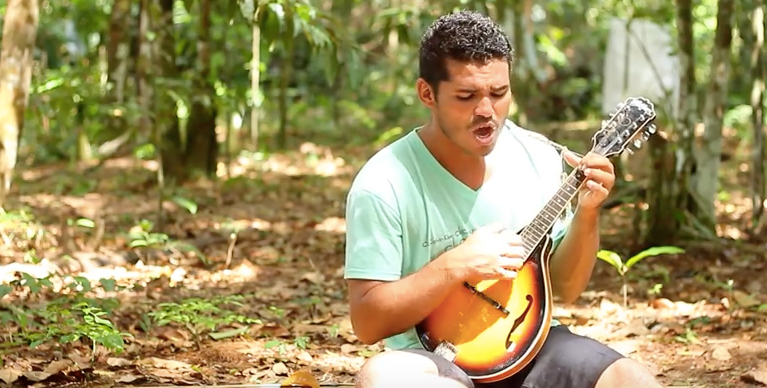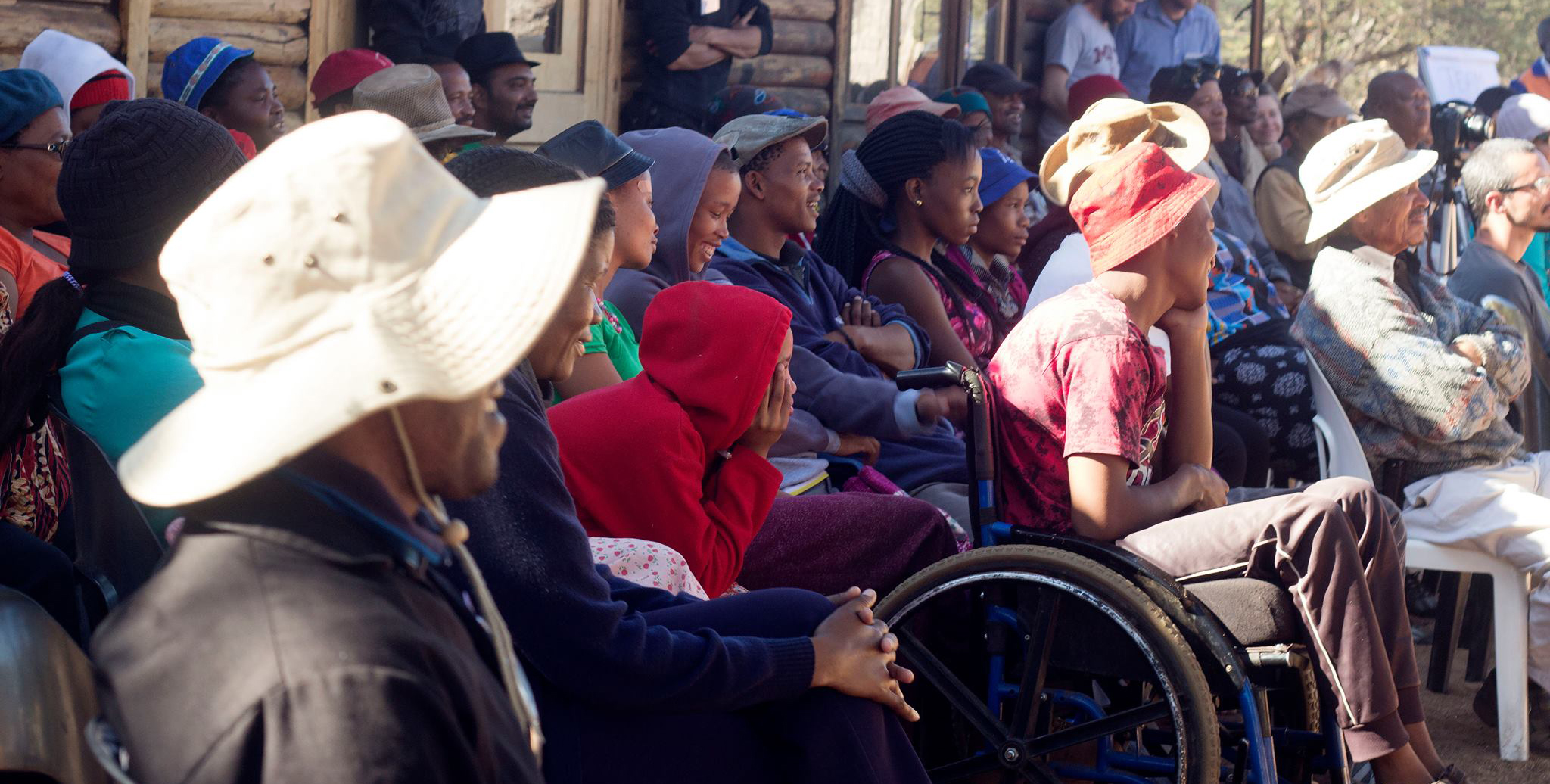IDIN Awards 18 Microgrants to Support Innovative Technologies & Approaches
Denis Obwona, an IDIN microgrant recipient tests his prototype, a rain water harvester.
IDIN is pleased to announce its latest microgrant awards supporting innovative and scalable technologies and approaches that address important social, economic, and environmental needs.
This fall’s recipients were chosen from a competitive pool of 35 applicants by a panel of technical and business experts, including many from the IDIN Network.
Applications were chosen based on criteria that included the applicant’s skill and experience, potential social impact of the project, scalability, marketability, and effectiveness of the proposed workplan. This year’s microgrant recipients represent seven different countries as well as a variety of sectors including agriculture, health, and energy.
The following are this fall’s microgrant recipients:
Teera Neeru — Abhinav Dey (IDDS 2015)
Abhniav will use this grant to design a fodder production technology that utilizes aquaponics to efficiently create cattle feed in an environentally sustainable way. Abhinav will also be working with community members in the design of this project to ensure that local cattle farmers' needs are addressed and prioritized.
Housing Structure Panel — Alejandra Villamil (IDDS 2016)
Currently, the indigenous community of Gachancipá is facing water shortage problems due to competition with industries that have moved onto their land. To address this issue, Alejandra will design a housing structure panel that harvests and filters rainwater and recycles grey water that can be used by the indigenous community of Gachancipá. The panel is also going to be built out of strong waterproof material so that it can be made into either a beam or wall.
Kamunye Cookstove — Carolyn Gabeya (IDDS 2016)
Carolyn and her team will be use their grant to construct more of their Kamunye Cookstoves, which are efficient and environmentally-friendly mud stoves that are catered to the community of Kakiri. This project also originated from IDDS Cookstoves 2016 which was held in Kampala, Uganda.
Rainwater Project— Denis Obwona (IDDS 2014)
Community members in Pader Town, Uganda have been experiencing less agricultural yields due to a lack of rainfall. To address this issue, Denis will use his grant to create a rainwater harvesting technology that is portable and easy to store.
Multifunctional Bici-machine— Alex Freese (IDDS 2016)
With this grant, Alex and the C-Innova team will design a multifunctional bici-machine with the Usme community in Bogotá. The machine will be made from recycled bicycle parts and will include functions such as a bike sheller to grind food and a bike blender that processes food.
Sigiri Cookstove— Jackson Mutegki (IDDS 2016)
Originating from IDDS Cookstoves 2016, this project involves the construction of stoves with low carbon monoxide emissions, higher safety standards, and more efficient fuel usage. Thus Jackson will be using the grant to build on and improve design ideas from IDDS Cookstoves and begin testing possible stove models.
Deep Sand Wheelchair— John Nambwa (IDDS 2016)
This project was first created in IDDS Botswana 2016 and was continued in the fall 2016 MIT D-Lab: Mobility course. Building upon these successes, John will use the microgrant to continue to develop his prototype for a wheelchair that can be used in deep sand. The wheelchair's design features wider, more durable wheels and drivers that can be adapted to existing wheelchairs so that riders will still be able to user their current products but be able to move through sand more easily.
Disinfecting Toilet Seat— Joseph Chipyoka (IDDS 2016)
This project aims to mitigate diarrhea and improve sanitation in city public toilets using the self-Disinfecting Toilet Seat (DTS). Joseph developed DTS to reduce germ load through a disinfectant aerosal mist that is sprayed at intervals during and after a person uses a toilet.
Low Cost Weather Station— Juliana Sarmiento (IDDS 2016)
Juliana will use the grant to build a low-cost weather station that will be able to monitor and continously record data on climate conditions. The low cost weather station will be built using Arudino and different sensors for temperature, air and soil humidity, pressure, rain drop, and gas concentration.
Bee Propolis Healthcare Products— Juliet Wanyiri (IDDS 2012)
In this project, Juliet and her team will use bee propolis to produce antibacterial healthcare products, which are created from extracted bee propolis. Using the grant, the team will conduct research on bee propolis and meet with stakeholders and experts in the field.
Biodigester— July Gomez (IDDS 2012)
Using their IDIN microgrant, July and her team will develop a biodigester that uses organic material to produce biogas and biofertilizer. This biogas can then be used as fuel for the community of San Antonio, where the project will be based.
Handcrafts Project— Kamanula Poso (IDDS 2011, 2013)
Kamanula will use the IDIN microgrant to improve his handicraft designs and create new models. Kamanula will also be focusing on conducting Creative Capacity Building trainings on handicraft making for rural-area students.
Small Scale Mobile Broiler Housing Unit— Kenneth Mubuyaeta (IDDS 2008, 2009, 2013)
Kenneth will use the grant to design a small scale poultry unit that is a housing apparatus suitable for broiler producers. The project's target audience includes small holder poultry producers in Lusaka Province and their potential customers.
Charcoal Briquette Press— Laban Nshimbi (IDDS 2013)
Through this project, Laban will be working with women from the Mufumbwe District in Zambia to create briquettes from biomass. This biomass will come from agricultural waste such as corn cobs and maize stalks.
Cassava Processing— Martin Kasompe (IDDS 2013)
In the Mabumba community, people often eat raw cassava, leading some to suffer from cassava poisoning. This project aims to address this issue by processing cassava into food for breakfast. Thus Martin will be using the grant to purchase cassava presses to process cassava.
Mobiticket— Nickson Nyakambi (IDDS 2016)
In Kenya, online bus booking is a difficult and inefficient process, causing travel times for bus commuters to increase. To address this issue, Nickson and his team have created Mobiticket, a booking service that helps passengers reserve bus tickets in advance without having to travel to different booking offices just to purchase a ticket. Thus the team will be using the grant to test their existing prototype and identify other potential bus companies to partner with.
Awamu Biomass Energy— Nolbert Muhumuza (IDDS 2016)
Awamu Biomass Energy is a social enterprise that manufactures clean and affordable natural draft TLUD gasifier stoves. Nolbert and his team will use the grant to build upon Awamu's successes and create more Awamu gasfier stoves.
Khidmatgaar— Sacha Ahmad (IDDS 2016)
Khidmatgaar.org is a web platform that captures, communicates, and tracks needs in emergency situations that include natural disasters and violent attacks so that willing volunteers can respond accordingly. Sacha and the rest of the Khidmatgaar team will use the grant to test their fully-functional platform with potential users to measure its functionality.
Energy Efficient Cookstoves— Said Twahir (IDDS 2016)
Said and his team will use the grant to distribute energy efficient cookstoves that are sub-contracted to local artisans from the informal sector. This project is also part of an existing enterprise that produces charcoal briquettes and currently has 8,000 households using their products. Building upon these successes, Said and his team will be testing their protype and attaining user feedback for the energy efficient cookstoves.






